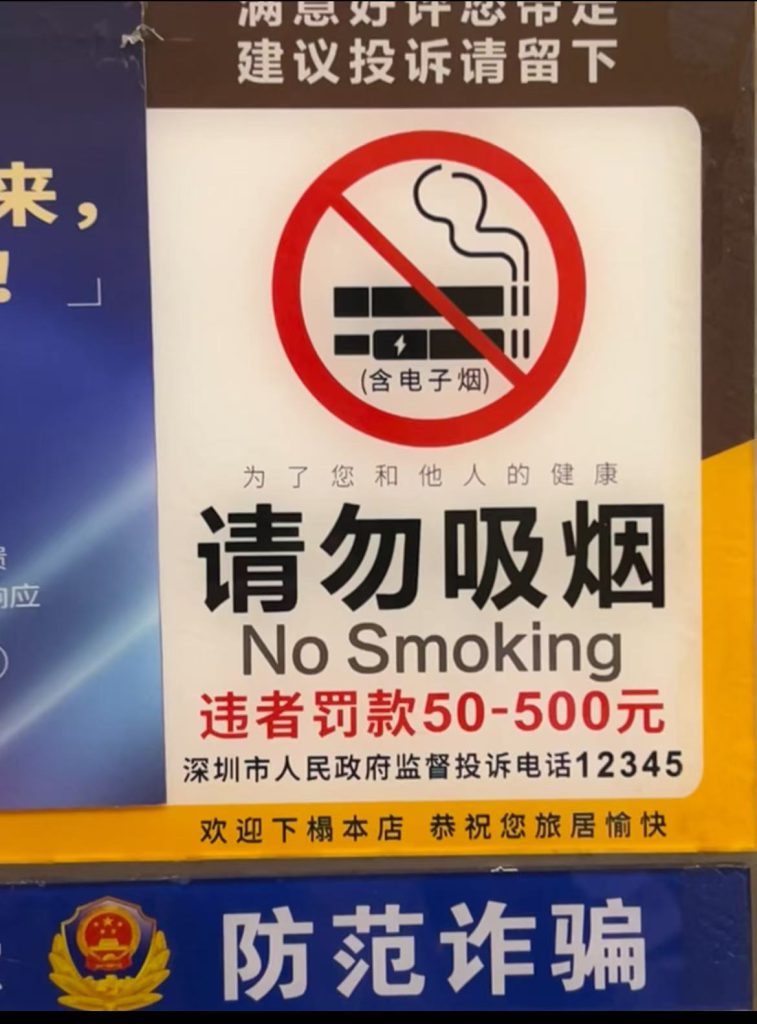Smokers turn a blind eye to no smoking sign in Shenzhen.
by Ivonne Deng
A tiny no-smoking sign that can hardly be seen is hung on a wall inside a bar in Shenzhen. A few ashtrays are placed on its bar counter.
“I know that smoking is banned in public areas including bars, but I never stop customers from smoking. Otherwise, my business will suffer,” its bartender, Zhang Jinglong, says as he passes an ashtray to one of the customers who is smoking while drinking.
“Customers can still smoke in bars and restaurants whenever they want,” Zhang, who has been working in the bar for three years, adds.
Since 2014, it has been illegal to smoke in bars and restaurants in Shenzhen. Offenders are subject to a penalty of RMB¥50 (US $6.8) if they stop smoking when being warned. A higher fine of RMB ¥200 (US $27.22) will be imposed on an offender if he or she refuses to stop smoking, and if he or she confronts officers, he or she will face a fine of RMB ¥500 (US $68.04).
Though hidden on a wall in the bar, the no-smoking sign clearly states the fine and complaint hotline.

But no one in the bar in Futian, southern Shenzhen, pays any attention to the sign, including the bartender.
“I’m also a smoker. I have been smoking one pack of cigarettes a day for eight years. The anti-smoking policy hasn’t changed my habits at all. All the smokers I know have never been fined,” Zhang says.
While allowing customers to smoke, he doesn’t worry that non-smokers will ruin the business.
“Non-smokers come to bars as well. They stay if they can bear it,” he continues.
While Zhang sees no one taking the smoking ban in Shenzhen seriously, the Public Hygiene and Health Commission of Shenzhen Municipality states that the city has the strictest smoking control policy among all cities in China.
The Shenzhen government released a special economic zone control smoking ordinance in 2014, and revised it in 2019 to include a ban on e-cigarettes.
The government claims that no-smoking signs are posted in nearly 90 per cent of indoor premises such as restaurants, government offices, and shopping malls.

University student Ni Ziyi, who often goes to restaurants and bars in Shenzhen, says that she cannot stand second-hand smoke.
“Once I find customers smoking in any indoor premise, I just leave,” she says, adding that she does not dare to confront smokers in a bar or restaurant.
“To avoid conflicts, I won’t stop them, and I have never seen any restaurant or bar operator do so. Smokers in China are mostly middle-aged men. They are difficult to talk to and easy to get angry. I think that is the main reason why nobody stops them,” she says.
The Year Two economics major student is disappointed when talking about the anti-smoking policy.
“I have never seen any authority or volunteers telling smokers to stop. I don’t think anyone is enforcing the law in Shenzhen. And I don’t believe there will be. Smokers will always smoke,” she says.
But Yu Mingyun, leader of a smoking control team in Longhua District, Shenzhen, a government-organized volunteer team, says he finds there is a drop in the number of smokers.

(Photo courtesy of Yu Mingyun)
Yu’s 20-member team patrols bars and restaurants in Longhua District once a week.
“We walk around the community, check if smoking signs are posted in every indoor premise such as restaurants and stores, talk to business operators, and stop smokers from smoking,” he says.
Stepping into a shop, Yu starts talking to the owner after checking the signs. “We are smoking control volunteers. We ask smokers to go outside or stop. Smoking is bad for health and dangerous as it may cause fire,” he says, though most business operators stay silent.
The team gives smokers pamphlets about the no-smoking policy, but rarely urges them to stop smoking if they do not want to.
The team also has to handle customers’ complaints. People can take photos of smokers in indoor premises like restaurants and upload them to a WeChat mini programme launched by the Shenzhen Tobacco Control Office in 2024. Volunteers then go to do checks in two days.
But as volunteers, they have no right to fine offenders. “Most smokers are willing to cooperate. But the only thing we can do is to give advice,” Yu says.
“I have taken part in volunteer work for five years. We do not see people smoking in office buildings and restaurants, and all my family members and friends don’t smoke or have quit smoking,” Yu shares.
Two college students joined his team as volunteers in March, and Yu believes more young people will join him to fight smoking.
“I know it is difficult to stop these smokers, but at least we should make an effort, and I am committed to doing this,” he says.
Edited by Bliss Zhu
Sub-edited by Cathleena Zhu







































